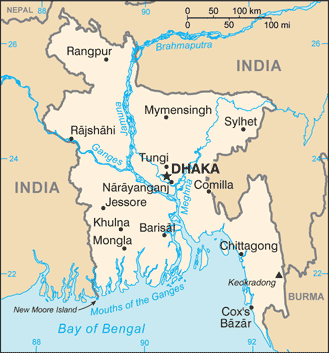Bangladesh Villagers Beat Christian for Defending Girls
 Muslim villagers beat a 22-year-old Christian man last month for defending Christian girls against routine harassment and bullying, sources said.
Muslim villagers beat a 22-year-old Christian man last month for defending Christian girls against routine harassment and bullying, sources said.
Sipon Mondol was beaten on April 20 while returning to his native village of Nittanandapur from Gangni, Meherpur district, some 200 kilometers (120 miles) west of the capital city of Dhaka, his father said. On April 15, at a cultural event to celebrate the Bengali New Year, Poresh Mondol said his son had defended Christian girls against the slurs of a group of young Muslim men in an exchange that led to a gang fight.
“They were making some suggestive remarks to our girls at the program,” Mondol said. “Some Christian boys, including my son, protested against it. A brawl between Muslim boys and the Christian boys followed the protest. They tried to drag my son to their village by getting hold of his shirt collar.”
The Mondol family informed the young Muslim men’s parents, and village elders assured the Christians that they would resolve the long-standing problem, telling them that such harassment would not happen again, he said.
“After the complaint, though, those Muslim boys became more predatory,” he said. “They beat my son on his way home from Gangni town on the evening of April 20. He was severely beaten. He was treated in the hospital for one day and released on April 21.”
The father of the young man told Compass that Christians were regularly shocked by the coarse language of their young Muslim neighbors at religious and cultural programs.
“To tease our girls, they use such filthy words in their speech that it leaves us feeling absolutely shattered,” the elder Mondol said. “We suffer shame in front of our family members.”
A case was filed against seven young Muslim men at nearby Titla village, asserting that they constantly harass Christian girls at Christian programs.
Lok Mondol, general secretary of the Church of Bangladesh in Meherpur district, told Compass that harassment of Christian girls at social and religious gatherings was a perennial problem.
“Previously we took several initiatives with the neighboring Muslim villagers to resolve this problem, but to no avail,” he said. “This time, we resorted to the law by filing a case, because the problem was becoming more unbearable each day; we got our backs against the wall.”
Mikha Mollick, a Christian belonging to a local Church of Bangladesh congregation, told Compass that continuous bullying of the Christian girls was an effort to gradually weaken Christians’ social standing.
“Sometimes we are made to think we are not part of this society because of their misbehavior,” Mollick said. “We live in a predominantly Muslim society here that is totally bankrupt of respect for Christians. We have nowhere to complain against them. Local political leaders care for us only for votes, but they do not like us at heart.”
The indecency of the Muslim villagers, mainly the young men, is a constant source of irritation, but usually Christians refrain from objecting or filing complaints in order to avoid further troubles, Mollick said.
Gangni Police Inspector Motiur Rahman told Compass that authorities were taking “the proper steps” in response to the Christians’ complaint but had so far arrested only one of the seven Muslim suspects—for harassing the girls, not for the assault.
“A case was filed against seven Muslim boys for bullying the Christian girls, mainly at the religious gatherings,” he said. “But this case was filed following a beating of a Christian boy for his protest against bullying by Muslim boys of Christian girls at a cultural program. Both the Christian boys and Muslim boys quarrelled with each other on that day.”














































